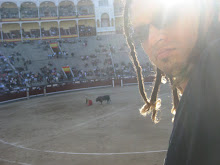
here's a passage that relates...(en espanol despues...)
"....Once, the Andalusian ‘Flamenco singer’ Pastora Pavon, La Niña de Los Peines, sombre Spanish genius, equal in power of fancy to Goya or Rafael el Gallo, was singing in a little tavern in Cadiz. She played with her voice of shadows, with her voice of beaten tin, with her mossy voice, she tangled it in her hair, or soaked it in manzanilla or abandoned it to dark distant briars. But, there was nothing there: it was useless. The audience remained silent.
In the room was Ignacio Espeleta, handsome as a Roman tortoise, who was once asked: ‘Why don’t you work?’ and who replied with a smile worthy of Argantonius: ‘How should I work, if I’m from
In the room was Elvira, fiery aristocrat, whore from
Then La Niña de Los Peines got up like a madwoman, trembling like a medieval mourner, and drank, in one gulp, a huge glass of fiery spirits, and began to sing with a scorched throat, without voice, breath, colour, but…with duende. She managed to tear down the scaffolding of the song, but allow through a furious, burning duende, friend to those winds heavy with sand, that make listeners tear at their clothes with the same rhythm as the Negroes of the Antilles in their rite, huddled before the statue of Santa Bárbara.
La Niña de Los Peines had to tear apart her voice, because she knew experts were listening, who demanded not form but the marrow of form, pure music with a body lean enough to float on air. She had to rob herself of skill and safety: that is to say, banish her Muse, and be helpless, so her duende might come, and deign to struggle with her at close quarters. And how she sang! Her voice no longer at play, her voice a jet of blood, worthy of her pain and her sincerity, opened like a ten-fingered hand as in the feet, nailed there but storm-filled, of a Christ by Juan de Juni...."
 La misma, en su lingua propia:
La misma, en su lingua propia:
"...Una vez, la "cantaora" andaluza Pastora Pavón, La Niña de los Peines, sombrío genio hispánico, equivalente en capacidad de fantasía a Goya o a Rafael el Gallo, cantaba en una tabernilla de Cádiz. Jugaba con su voz de sombra, con su voz de estaño fundido, con su voz cubierta de musgo, y se la enredaba en la cabellera o la mojaba en manzanilla o la perdía por unos jarales oscuros y lejanísimos. Pero nada; era inútil. Los oyentes permanecían callados.
Allí estaba Ignacio Espeleta, hermoso como una tortuga romana, a quien preguntaron una vez: "¿Cómo no trabajas?"; y él, con una sonrisa digna de Argantonio, respondió: "¿Cómo voy a trabajar, si soy de Cádiz?"
Allí estaba Eloísa, la caliente aristócrata, ramera de Sevilla, descendiente directa de Soledad Vargas, que en el treinta no se quiso casar con un Rothschild porque no la igualaba en sangre. Allí estaban los Floridas, que la gente cree carniceros, pero que en realidad son sacerdotes milenarios que siguen sacrificando toros a Gerión, y en un ángulo, el imponente ganadero don Pablo Murube, con aire de máscara cretense. Pastora Pavón terminó de cantar en medio del silencio. Solo, y con sarcasmo, un hombre pequeñito, de esos hombrines bailarines que salen, de pronto, de las botellas de aguardiente, dijo con voz muy baja: "¡Viva París!", como diciendo. "Aquí no nos importan las facultades, ni la técnica, ni la maestría. Nos importa otra cosa."
Entonces La Nina de los Peines se levantó como una loca, tronchada igual que una llorona medieval, y se bebió de un trago un gran vaso de cazalla como fuego, y se sentó a cantar sin voz, sin aliento, sin matices, con la garganta abrasada, pero... con duende. Había logrado matar todo el andamiaje de la canción para dejar paso a un duende furioso y abrasador, amigo de vientos cargados de arena, que hacía que los oyentes se rasgaran los trajes casi con el mismo ritmo con que se los rompen los negros antillanos del rito, apelotonados ante la imagen de Santa Bárbara.
La Niña de los Peines tuvo que desgarrar su voz porque sabía que la estaba oyendo gente exquisita que no pedía formas, sino tuétano de formas, música pura con el cuerpo sucinto para poder mantenerse en el aire. Se tuvo que empobrecer de facultades y de seguridades; es decir, tuvo que alejar a su musa y quedarse desamparada, que su duende viniera y se dignara luchar a brazo partido. ¡Y como cantó! Su voz ya no jugaba, su voz era un chorro de sangre digna por su dolor y su sinceridad, y se abría como una mano de diez dedos por los pies clavados, pero llenos de borrasca, de un Cristo de Juan de Juni..."

No comments:
Post a Comment